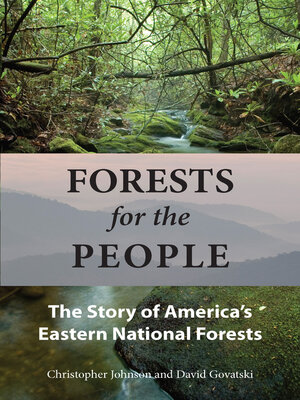Forests for the People
ebook ∣ The Story of America's Eastern National Forests
By Christopher Johnson

Sign up to save your library
With an OverDrive account, you can save your favorite libraries for at-a-glance information about availability. Find out more about OverDrive accounts.
Find this title in Libby, the library reading app by OverDrive.



Search for a digital library with this title
Title found at these libraries:
| Library Name | Distance |
|---|---|
| Loading... |
Forests for the People tells the powerful and often overlooked story of how the eastern national forests came to be—not through top-down mandates, but through grassroots action, political will, and a shared vision of long-term stewardship. At the heart of the book is the passage of the Weeks Act of 1911, which laid the foundation for conserving millions of acres across the East, South, and Great Lakes regions. But just as compelling is the coalition that made it happen: citizens, conservationists, business leaders, and politicians working across divides to stop the devastation caused by unchecked logging and wildfire.
Through vivid historical narrative, the book traces the rise of a conservation movement born out of environmental crisis—from the clearcut slopes of New England and the Southern Appalachians to the damaged watersheds of the Great Lakes. It then shifts to the present day, with eight detailed case studies examining the complex realities of forest management: from fire and timber use to invasive species, endangered wildlife, and the pressures of development at forest edges.
For readers concerned with the future of public lands, Forests for the People offers more than history—it delivers a blueprint for how diverse interests can come together to protect landscapes that sustain both ecosystems and communities.
Through vivid historical narrative, the book traces the rise of a conservation movement born out of environmental crisis—from the clearcut slopes of New England and the Southern Appalachians to the damaged watersheds of the Great Lakes. It then shifts to the present day, with eight detailed case studies examining the complex realities of forest management: from fire and timber use to invasive species, endangered wildlife, and the pressures of development at forest edges.
For readers concerned with the future of public lands, Forests for the People offers more than history—it delivers a blueprint for how diverse interests can come together to protect landscapes that sustain both ecosystems and communities.







